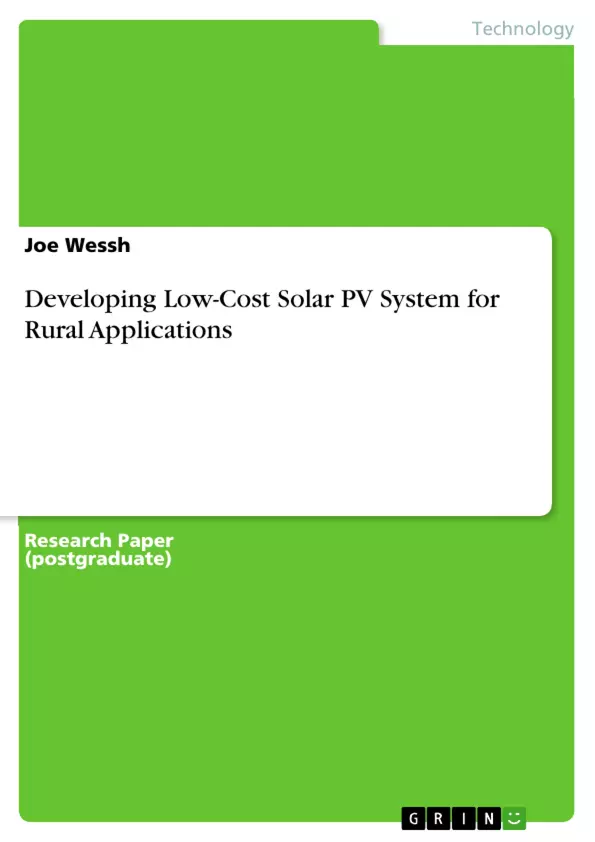Electricity is an essential thing for a human life as it influences every part of people's lives and it is important to the effective functioning of a healthy economy and to ensure a healthy population. However, there are still millions of people deprived of electricity, most of them in the rural areas where electrification experiences challenges such as low profitability, high economic investments or difficulty of operation, among others. At the moment, solar energy has turned into a popular and meaningful alternative energy source to meet specific demands around the world due to the climate change and global warming caused by non-renewable energy resources. The aim of this project is to develop a simple and cost-effective Photovoltaic (PV) system for the rural regions where grid electricity is not available. Specifically, the study will focus on the development of PV system in Kitui County. The research will use both quantitative and qualitative approaches to collect the relevant data. This proposed project will help improve the access and transmission of electricity in Kitui County; thus, enhancing the lives of people in the region.
Inhaltsverzeichnis (Table of Contents)
- CHAPTER ONE: INTRODUCTION
- 1.1 Background of Study
- 1.2 Problem Statement
- 1.3 Justification
- 1.4 Objectives
- 1.4.1 Main Objective
- 1.4.2 Specific Objectives
- 1.5 Study Scope
- CHAPTER TWO: THEORETICAL BACKGROUND AND LITERATURE REVIEW
- 2.1 Theoretical Background
- 2.2 Energy Demand, Energy policy and SBT in Kenya
- CHAPTER THREE: MATERIALS AND METHODS
- 3.1 Study Location
- 3.2 Research Design
- 3.3 Sample Design
- 3.4 Data Collection Methods and Procedure
- 3.5 Data Processing and Analysis
- CHAPTER FOUR: WORK PLAN AND BUDGET
- 4.1 Work Plan
- 4.2 Budget
Zielsetzung und Themenschwerpunkte (Objectives and Key Themes)
This research proposal aims to investigate and develop a low-cost solar photovoltaic (PV) system for rural applications in Kenya. The primary objective is to design a cost-effective system that can provide reliable electricity access to rural communities while promoting sustainable energy practices. The key themes of this study include: * **Sustainable energy solutions for rural areas** * **Developing cost-effective solar PV systems** * **Energy access and its impact on socio-economic development** * **Assessing the feasibility and viability of low-cost solar PV systems** * **Optimizing system design and performance for rural contexts**Zusammenfassung der Kapitel (Chapter Summaries)
Chapter one provides a comprehensive overview of the background, problem statement, justification, and objectives of the research. It highlights the critical need for sustainable energy solutions in rural Kenya, particularly for electrification. Chapter two delves into the theoretical foundations of solar PV technology, reviewing existing literature on energy demand, energy policy, and sustainable building technology (SBT) in Kenya. It explores the challenges and opportunities associated with promoting solar PV adoption in rural settings. Chapter three focuses on the research methodology employed in the study, outlining the study location, research design, sampling methods, data collection procedures, and data analysis techniques. Chapter four presents the work plan and budget for the proposed research, outlining the timeline and resources required for successfully completing the project.Schlüsselwörter (Keywords)
This research focuses on the development of low-cost solar PV systems for rural applications in Kenya. Key terms include: sustainable energy, rural electrification, solar photovoltaic technology, cost-effectiveness, feasibility studies, energy access, and socio-economic development. The research aims to contribute to a better understanding of the technical and economic viability of solar PV systems as a means to address the energy needs of rural communities in developing countries.Frequently Asked Questions
What is the main goal of the Kitui County solar project?
The goal is to develop a simple and cost-effective Photovoltaic (PV) system for rural regions in Kenya where grid electricity is currently unavailable.
Why is solar energy a good alternative for rural Kenya?
Solar energy addresses the challenges of low profitability and high investment costs of traditional grid expansion while providing a renewable solution to climate change.
How will the research collect data for this project?
The study uses both quantitative and qualitative approaches, including site-specific research design and data processing techniques to ensure feasibility.
What are the socio-economic impacts of rural electrification?
Access to electricity improves health, education, and the functioning of the local economy, significantly enhancing the overall quality of life for the population.
What is Sustainable Building Technology (SBT) in this context?
SBT refers to the integration of sustainable energy solutions like PV systems into rural infrastructure to promote long-term environmental and economic viability.
- Citation du texte
- Joe Wessh (Auteur), 2018, Developing Low-Cost Solar PV System for Rural Applications, Munich, GRIN Verlag, https://www.grin.com/document/493831



